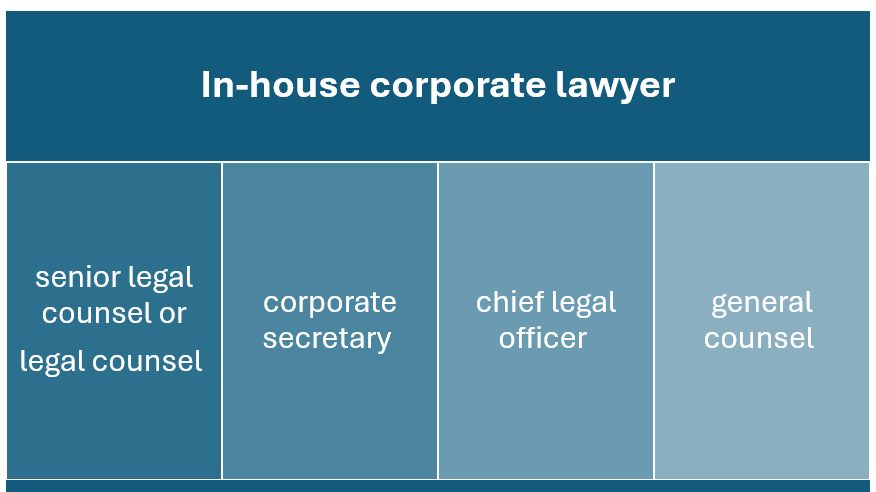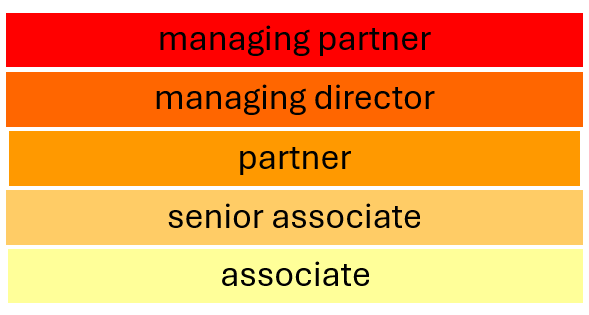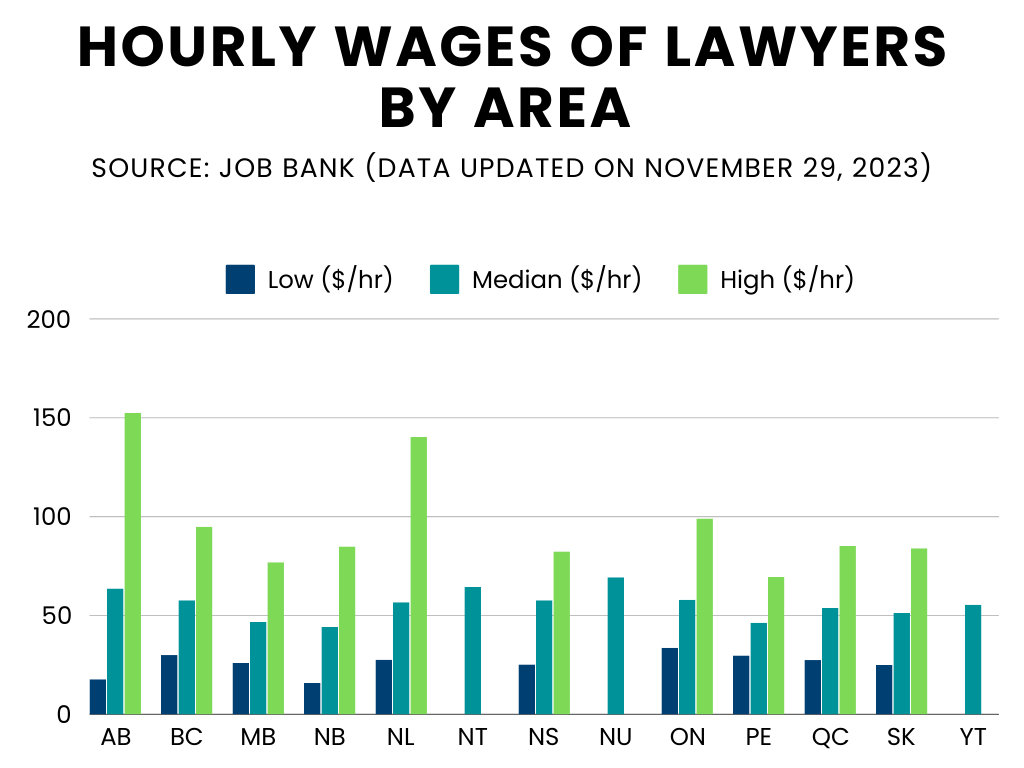
Wondering how much corporate lawyers earn? We have the answer. Read about the different factors affecting earnings in relation to their roles and responsibilities

A lot of us are drawn by the charm of the corporate world – to land a corporate job and work for a company, whether large or small. This also applies to lawyers who think of practicing corporate law or switching from litigation to corporate work. But as with any other employment, you may ask how much do corporate lawyers earn in Canada, and is it even worth pursuing?
This article is for aspiring lawyers who are thinking about working in the corporate world, or for lawyers who want a career shift to corporate law.
Corporate lawyers in Canada earn an average of $100,000 to $150,000 per year. This is based on the salaries reported by corporate lawyers among different companies, and in different locations, in the country.
There are several factors that affect how much you’ll make every year. These will also vary depending on your personal circumstances. While this serves as a guide, know that these figures and applicability will differ with each case.
Lawyer salaries may vary more in wake of competition law changes: recruiter report. Provisions on price- and wage-fixing could prevent 'lockstep compensation discussions'. Insights from Mark Fenwick, Impact Recruitment.https://t.co/VrdUWn62GK
— Canadian Lawyer Magazine (@CanLawMag) June 16, 2024
Here are some factors that will affect how much will you make as a corporate lawyer in Canada. For more resources on corporate commercial law in Canada, check out our Corporate Commercial page.
The employer you’ll be working with will be a large factor in how much you’ll earn as a corporate lawyer. Is it a large company whose scope covers different cities, provinces, and territories? Is it a relatively small business with a specific target consumer or audience? These factors would then be connected to your roles and responsibilities.
Right off the bat: the higher the position, the higher the salary. And this is also relevant when it comes to lawyers whose services are sought after by clients.
Your position in the company can be on an entry-level or mid-level, a junior or senior position. It will also vary based on your role:
Climbing the corporate ladder would mean earning more as a corporate lawyer, but not without the added responsibilities. Here’s a sample of different roles of an in-house corporate lawyer:

The same goes for working in a private law firm, as there are different levels of positions within the firm’s structure. Here’s an example of a typical hierarchy of lawyers in a firm:

Get to know the top 10 boutique corporate law firms for 2024-2025, voted by readers of Canadian Lawyer.
One city, province, or territory may differ on their standard rates of salaries compared to another. This is mostly based on the cost of living in that area and regulations imposed by the government, among other factors.
When it comes to how much corporate lawyers earn, you may be receiving less compared to your counterparts in another province. Such variance also applies to all lawyers’ earnings in general.
Below is a table from the data provided by the Canadian government’s Job Bank which shows the difference between the wages of lawyers in every province and territory:

Here’s a factor that you can have control over: your field of expertise. As with any other profession, practicing in a specific area will be favourable to you. When charging clients, especially when crafting your retainer or engagement agreement, you can justify increasing your lawyer’s fees if corporate law is your specialty.
You can even take your expertise further when it comes to corporate law in Canada, since it has many sub-fields which you can concentrate on:
When companies merge, or when one acquires another, having M&A corporate lawyers is required. They oversee due diligence in preparation for the M&A until the deal is closed. If issues arise pre- or post-M&A, corporate lawyers will have to take action. This area is related to competition and anti-trust laws of Canada and even that of the other countries.
This largely deals with regulatory laws affecting corporations that are doing business in Canada. Corporate lawyers are needed so that every transaction and dealing of the corporation is well within the bounds of the law. Lawyers also guide the actors within the corporate structure (e.g., directors, officers) on what the laws say for their corporate compliance.
Corporate lawyers who have a financial and taxation background are always in demand. This area is connected to Canada’s tax laws and regulations imposed by the Canada Revenue Agency. Due to the complexities of these laws, it’s important that corporations understand and are updated on corporate finance and tax laws.
When a corporation must enforce its rights, or when it finds itself involved in a legal issue, corporate lawyers enter the picture. This is where the reactive part of corporate management applies through settling conflicts involving the corporation, or litigating matters before the court. In any of these proceedings, corporate lawyers are there to represent their clients in dealing with these legal matters.
These are just some of the roles that you can specialize in as a corporate lawyer. If these do not help you increase your earnings as a corporate lawyer, it may still be helpful to expand your client base.
Related to specialization is your educational background, not just from undergraduate degree until your law school years, but also your graduate and doctorate degrees. Although your Juris Doctor (JD) or Licentiate in Law (LLL) degree has given you enough credibility, continuing your education after this is also a good suggestion.
As a corporate lawyer, you may be interested in the following post-law school degree programs. Before we dive in, here’s a primer on LLM degrees and what they’re good for.
The Université de Montréal – Faculté de Droit happens to be on our list of law schools with the lowest tuition fees in Canada.
Meanwhile, hear more about Osgoode’s LLM in International Business Law with this video:
Check out our comprehensive guide on Canadian law schools. This includes details such as admission requirements, tuition costs, and description of each law school in Canada.
Having a specialty, and being backed by further legal education, has a lot of advantages, such as:
Although not a factor affecting the value of your earnings as a corporate lawyer, you may be interested to know about the different payment methods. Below are the common (and legally approved) methods of getting paid as a lawyer in Canada:
This works when you’re hired by a company as part of their in-house legal team on a full-time basis. As a regular employee, your salary is covered by the rates prescribed by the company for its employees, subject to the laws on labour standards.
This occurs when you’re acting on a limited scope retainer, and the terms of payment and scope of work are set out in a retainer agreement. This may also refer to the advance or additional payment given by the client at the start of your engagement with them or when you’ve accepted their case.
In this payment method, you’ll only be paid if the case has been settled or when a final decision has been reached. The details on payment and work will be outlined in your engagement agreement with the client.
Usually, when a case is successful or has been settled, you’ll receive a percentage (according to the initially agreed upon rate) of the award or settlement. If the case fails, you may only be entitled to receive the retainer’s fee and other disbursement costs.
When the basis is the time you’ve spent on a particular case, you may charge the client an hourly rate. This includes the time to prepare legal documents, do court appearances, and everything else related to the case. Your firm usually sets the rate that will be followed if the payment is hourly.
Flat rate
Compared to the hourly rate, you’ll be paid a fixed amount regardless of the time you’ve spent on the case if it’s on a flat rate basis. This method of payment usually applies when you’re only required to do a transaction or a specific task for the client. Here, the basis is not the time you’ll be spending on the transaction or task, but on its nature.
Law societies advise lawyers that every engagement with a client be put into writing, especially on the method and amount of payment. This prevents any future disputes with the client when it comes to lawyer’s fees. This applies to all lawyers, no matter the specialization.
As discussed above, earnings may also be measured based on a corporate lawyer’s specific work and duties for their clients. Here are some possible duties:
While your earnings as a corporate lawyer in Canada may range from $100,000 to $150,000 per year on the average, this will still depend on the given factors mentioned above. It may be lower than this threshold, especially for starting positions or fewer roles. Conversely, it can go higher than $150,000 per annum, according to your specialty, experience, reputation, and position.
More than the salary, what’s most important is how you’ll practice law with integrity and ethical standards. As our mentors have always reminded us, taking care of the needs of your corporation-clients with passion is more valuable than having the greatest number of digits in your payroll.
Read this guide on how lawyers get paid in Canada.
Now that you have an idea how much corporate lawyers earn, is pay a major factor in your career choices? Let us know in the comments